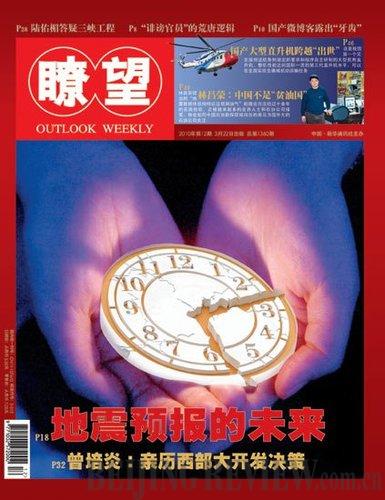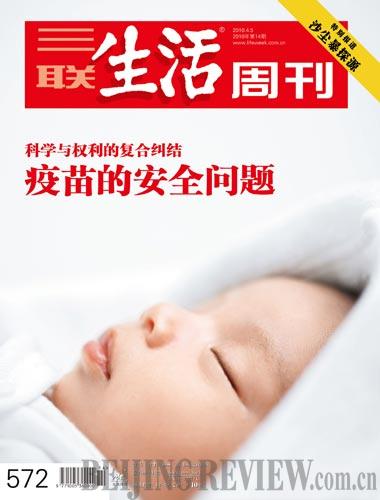|
 |
|
Outlook Weekly |
Outlook Weekly
Earthquake Forecast Feasible
March 22, 2010
Humans are still facing the threat of earthquakes. In 2010, massive earthquakes successively rocked the world and people began to ponder how to cope with earthquakes in the future. Currently, there exist divergences about earthquake forecasts. Some believe that earthquakes can be scientifically forecasted by observing the impending geoelectric (HRT wave driven by tidal forces) precursors or analyzing the relationship between drought and earthquakes. These methods have been proved to be useful in practice. They are not fully adopted so far, however, due to the obstacles in technology and policy. Others argue that instruments for accurate forecasting are unavailable. If an inaccurate forecast was adopted, but the facts proved it was wrong, the consequences would be fatal. For example, a false forecast may cause great panic among people, which will in turn lead to social turmoil. In fact, current forecasts still have positive effects. A prediction on possible earthquakes may alleviate the suffering brought by the disaster to a certain degree. With the help of the current technology, researchers could release earthquake forecasts so that the government could take preventive measures to minimize the damage.
 |
|
Sanlian Life Weekly |
Sanlian Life Weekly
Vaccine Tragedy
April 5, 2010
Nearly 100 children have died or fallen ill in Shanxi Province after receiving improperly stored vaccines supplied by a vaccine maker. Details of the manufacturer, who had a monopoly on vaccine distribution and supply after allegedly bribing health officials, were released by a whistle blower who worked with the Shanxi Provincial Center for Disease Control and Prevention in 2007. The vaccine scandal sparked a red alert as local authorities failed to calm public concerns, as they focused more on pledges to investigate rather than on details of the problem at the hastily held press conference.
Currently, the government purchases certain vaccines for compulsory vaccinations and provides them free to the public. But no vaccine is entirely risk free and adverse reactions are common, though with a low rate of occurrence. The problematic vaccine is a reminder that some vaccine producers do cut corners in production and quality examinations and some local health authorities have profited from promoting the sales of vaccines.
 |
|
China Newsweek |
China Newsweek
Tablet Competition
April 12, 2010
Apple Inc's iPad tablet computer went on sale in early April, drawing crowds to stores. It is Apple's bid to turn tablet computers into popular consumer devices. The iPad doubles as a full-color e-reader of books, newspapers and magazines and users can surf the Internet, watch videos and play games on it.
The iPad's first wave of reviews praised its ability to deliver digital books and video quickly, saying it measures up well against other devices, including Amazon.com Inc's Kindle e-book reader. With the advent of the devices, a new order in the publishing industry has been formed, allowing readers to purchase and read online books, magazines and newspapers any time they choose, at a good price.
Many book and newspaper publishers are anticipating similar changes in their industry brought about by a proliferation of iPads and other tablet computers. Chinese computer manufacturers, too, are watching the development of the tablet closely. It is reported that some electronics manufacturers had been producing and marketing a similar product with even more built-in functions. Chinese enterprises should seize the opportunity at this early stage to position themselves in winning a global share, for there are more Internet users in China than any other country on the planet.
The Beijing News
Shadow of Bankruptcy
April 8, 2010
With the fall in the birth rate during the past decades, some colleges in China, particularly those run privately, are on the verge of bankruptcy. While these educational institutions are worried about their future, it is nonetheless a good opportunity to improve China's educational system. Since the 1990s, China's colleges and universities have been allowed to charge tuition fees, which improves their financial situation. But the core of the institution, such as its culture, ethics and fairness, is moving backwards instead of forward
Today's education centers too much on profit making. In order to make money, some colleges borrow big to build more facilities and try to enroll more students. Education software should be improved otherwise, instead of turning a profit, the survival of these colleges will be a major headache.
China Youth Daily
Psychological Warnings
April 1, 2010
A man stabbed eight school children to death and injured five others recently in Nanping City in southeast China's Fujian Province.
The killer was a doctor from a local community clinic who lost his job and had had several failed relationships. It was reported that the man was suffering from depression before he carried out the killings.
This is not the first case of its kind in recent years. It shows a dire need for a social security network to provide for people like the killer, so that they are able to lead meaningful lives while addressing psychological problems they may be suffering.
Who should do this work and how should such people be taken care of? We need a well-designed plan to take care of those facing adversity, in particular those suffering from psychological problems. This is fundamental to maintaining a well-balanced society.
Xinmin Evening News
Drought Reveals Negligence
April 8, 2010
Since last autumn, China's southwestern region has been plagued by a rarely seen drought, which has seriously affected people's lives. The natural disaster reveals years of insufficient input into irrigation works. Without this necessary work, even if current problems are solved, the threat of drought will remain. In the 1980s, every farmer was given the task of digging water canals in every village. Years of joint efforts helped connect canals in villages and reservoirs were always full of water.
In recent years there has been a great deal of construction of basic agriculture infrastructure, but insufficient investments have been put into building canals and reservoirs. Negligence has led to slurry-filled reservoirs and canals. The severe drought in southwest China is a warning. If we only invest in projects that will bring profit at low costs while paying no attention to public undertakings, such as irrigation works, and delay repairs year after year, droughts and flood disasters are inevitable. Irrigation work might not be as profitable as hydropower stations, but they are the guardian angels of local residents in severe natural conditions and a precondition for further economic achievement.
|